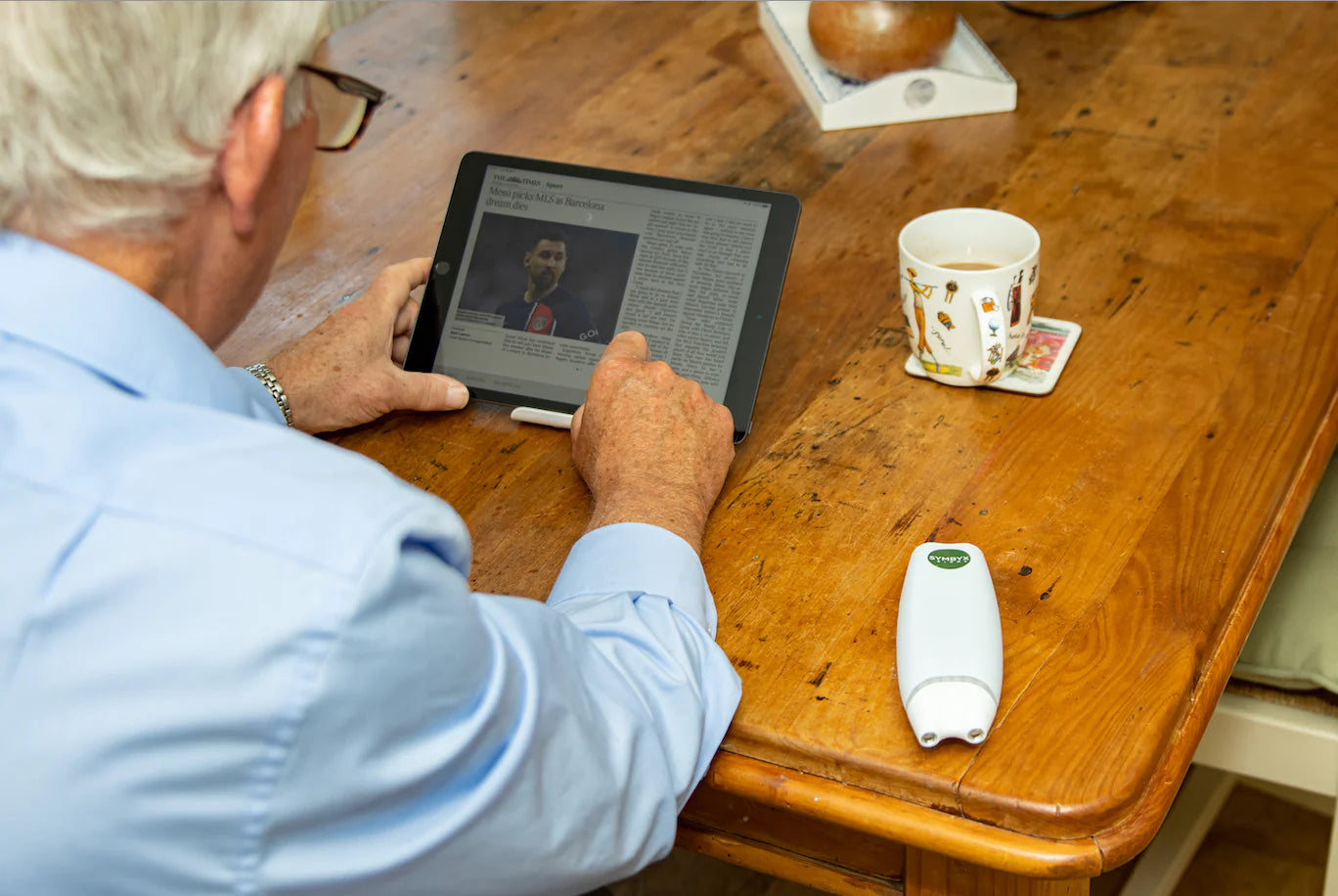
23 October 2025
New study shows that participants using light therapy devices over several months experienced statistically significant improvements in balance, gait, and anxiety.
Australian-founded medical technology company SYMBYX today announced compelling results from a 72-week randomised controlled trial (RCT), which demonstrated improvements in a range of Parkinson’s disease symptoms following the use of the PDCare laser and the SYMBYX Neuro wellness helmet, complementary light therapy devices. These results provide further support that light therapy, especially when combined with exercise, can be a safe adjunct treatment for people living with Parkinson’s.
Participants and carers provided feedback on the benefits of the light therapy on the changes observed throughout the trial's course :
"I found with the light treatment, I had much more energy," reported participant Andy, who used the SYMBYX devices as part of the clinical trial.
Ruth, spouse and caregiver to Peter, a trial participant, noted the impact his on mood and activity: “His mood lifted. He was more social. He seemed invigorated, which was very good."
Conducted at the Parkinson’s Wellness Innovation Centre in Ontario, Canada, and led by co-principal investigators Anita Saltmarche (BScN, MHSc) and Orla Hares (BSc, Hon PT), this study involved 59 participants with moderate Parkinson’s disease. The trial compared two groups: one receiving active light therapy treatment – comprising the PDCare Laser, directed towards the gut , combined with the SYMBYX Neuro, a transcranial LED helmet - while the other group received a sham treatment. Both groups also participated in a prescribed exercise program.
Participants completed two initial stages: Stage 1 involved eight weeks of either active or sham therapy, and Stage 2 involved an additional eight weeks of active treatment for everyone. After these first two stages, both groups improved in a range of areas, confirming a widely anticipated short-term placebo effect. However, after Stage 3 - involving 43 participants (73% of the starting cohort) under open-label conditions for an average of 28.7 weeks - a group of 17 participants who continued with light therapy during Stage 3 showed significant further improvements in functional mobility and MDS-UPDRS scores versus the remaining 26 who did not.
The following outcomes were recorded at baseline and after each stage. Please note that each participant had received at least 1 or 2 stages (8-16 weeks) of light therapy before Stage 3 commenced.
-
Functional Mobility: Timed Up and Go (“TUG”) scores improved by 14% over baseline among participants who continued treatment in Stage 3, compared with a 5% worsening in those who discontinued.
-
MDS-UPDRS total score- Unified Parkinson’s Disease Rating Scale : The MDS-UPDRS is the gold-standard measure of Parkinson’s progression – typically, patients experience an average deterioration of 4.7 points (equating to an increase in the raw score) per year. Participants who continued treatment in Stage 3 improved by 20% over baseline (an average 12-point decrease), compared with an 11% improvement (7-point decrease) in those who discontinued.
-
MDS-UPDRS Part II- Patient rated score for quality of life: Participants who continued treatment in Stage 3 improved by 32% over baseline (an average 5-point decrease), compared with a 21% improvement (an average 3-point decrease) in those who discontinued.
-
MDS-UPDRS Part III - Motor Examination: Participants who continued treatment in Stage 3 improved by 19% ( an average 5-point decrease), compared with a 11% improvement (an average 3-point decrease) in those who discontinued.
-
Beck Anxiety Score- Anxiety: Participants who continued treatment in Stage 3 improved by 11%, compared with a 6% worsening in those who discontinued.
Anita Saltmarche, Co-Principal Investigator, commented:
“These results provide further support for the use of light as a safe, effective, research-based treatment for Parkinson’s symptoms. Based on standardized testing, participants demonstrated significant improvements in both their motor and non-motor symptoms, resulting in meaningful improvements in their quality of life and that of their families.”
Orla Hares, Co-Principal Investigator, added:
“Being part of a trial demonstrating significant improvements using reliable, gold-standard outcome measures is incredibly meaningful. It allows us to confidently implement therapies in the clinic that we know make a real difference in our clients.”
Dr Wayne Markman, CEO of SYMBYX said:
“We’ve learned a lot from this research – that future light therapy trials need to be of longer duration because a slower and more consistent approach definitely pays off. I'm really looking forward to the next large clinical study with Newcastle University, UK, along with a bio-marker component by The University of Leeds.”
Parkinson’s Disease is the world’s fastest-growing neurodegenerative condition, affecting over 12 million people globally and over 150,000 people in Australia. It’s a progressive condition, with many symptoms largely driven by a reduction in dopamine – a neurotransmitter that regulates critical motor and non-motor skills including movement, mood, and motivation. SYMBYX’s light therapy device, the PDCare laser, is a complementary therapy designed to provide symptomatic relief by targeting the gut-brain axis through the SYMBYX Abdomen-Neck Protocol. The gut-brain axis is increasingly recognised key transmission pathway, particularly in “body-first” Parkinson’s.
*Please note that the testimonials reflect the experience of individual trial participants. Individual results may vary.
**This content is provided by SYMBYX for informational purposes only and is based on research data related to SYMBYX and the clinical trial published here. This trial was funded by SYMBYX. SYMBYX devices are subject to different regulations, permits and clearances in each country, and may not be available in all countries. The SYMBYX Neuro is classified for general wellness only, not for medical use. The information provided does not constitute medical advice.
SYMBYX Biome is an Australian-founded MedTech empowering individuals to enhance their health through targeted light therapy. SYMBYX lasers are MDD-compliant and ARTG listed. The PDCare laser is a complementary therapy for reducing Parkinson’s symptoms, with users reporting improvements in certain motor and non-motor symptoms.
Media Enquiries: Elizabeth Butler | marketing@symbyxbiome.com | +61 8066 9966

